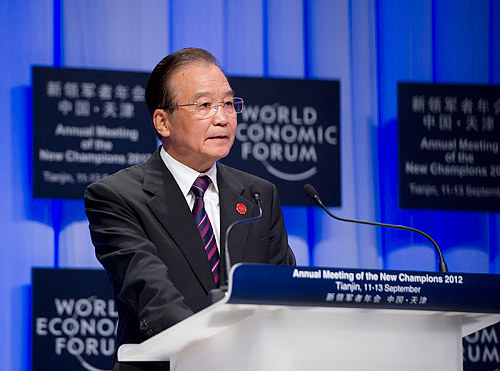|
 |
|
KEYNOTE SPEECH: Chinese Premier Wen Jiabao addresses the opening ceremony of the Annual Meeting of the New Champions 2012 on September 11 (HUANG JINGWEN) |
As the euro zone sovereign debt crisis continues to cast a pall over the global economy, more collaboration was widely called for at the World Economic Forum Annual Meeting of the New Champions 2012.
The forum, also known as the Summer Davos, was held from September 11 to 13 in the north Chinese port city of Tianjin and was the sixth forum of its kind held in China. Under the theme Creating the Future Economy, the three-day event featured interactive programs on issues including the euro crisis and China's future economy.
Risks are decreasing in the euro zone's fiscal and monetary systems, as well as in its financial markets, but the risks to economic growth are rising, said Zhu Min, Deputy Managing Director of the International Monetary Fund (IMF).
Because Europe is one of the world's largest economies and accounts for one third of value-added exports to Asia, a deteriorating European economy will have a huge impact globally.
In the worst-case scenario, further disaster in Europe could lead to a 1.5-2 percent growth cut in the United States and a 1-1.5 percent cut in China, according to IMF predictions, said Zhu.
While Europe buckles under a mountain of debt, the U.S. economy has been struggling with its recovery, many at the forum in Tianjin looked to China to prop up the global economy.
The first priority of China should be to sustain growth, said Zhu. Its stable growth will immensely benefit the world and have a spillover effect in Asia, the United States and elsewhere. While sustaining growth, China should never forget how important structural reforms are to its own economy, Zhu added.
At the opening ceremony of the 2012 Summer Davos, Chinese Premier Wen Jiabao summarized China's achievements over the past 10 years.
From 2002 to 2011, China's GDP grew at an average annual rate of 10.7 percent and moved from the world's sixth largest economy to the number two spot behind the United States. Per-capita GDP rose from around $1,000 to $5,432. China's foreign trade volume is now the second largest globally and foreign exchange reserves exceed $3 trillion, said Wen.
Economic structures were improved to raise the quality and efficiency of the country's development. A shift from fast growth to sound growth was a fundamental change in the priorities of China's development in the past decade. Strategic adjustments in China's economy were made in an effort to shift the country's growth model while bolstering development, Wen said.
As global economic woes have continued to weigh heavily on China, the Chinese economy expanded 7.8 percent during the first half of the year after the government moved to counter inflation and surging property prices.
The 7.8-percent growth, though lower than in previous periods, still outperformed other major economies.
Wang Yiming, Vice President of the Academy of Macroeconomic Research of the National Development and Reform Commission, said the slowdown does not necessarily mean diminishing economic strength or business opportunities in China since the country's economic aggregate is now larger and more solid than before.
While making its due contributions to the global economy, China, the world's largest developing country, called for more global support at Summer Davos.
China has already made major contributions to the world economy and global stability, and yet it is facing increasing trade protectionism, a common measure amid recession, said Xiao Lian, an expert on economic studies at the Chinese Academy of Social Sciences.
| 